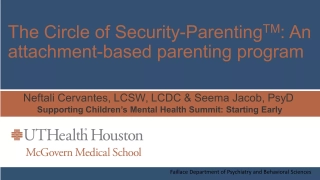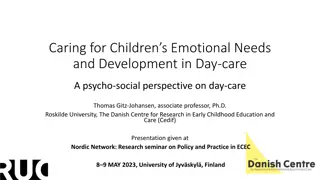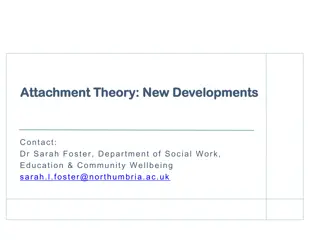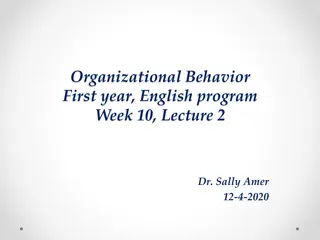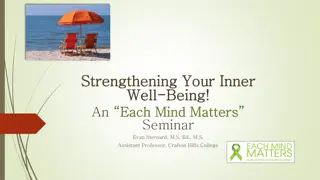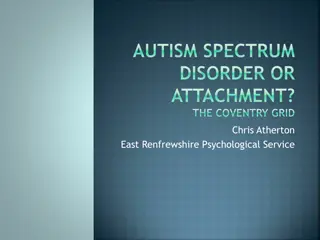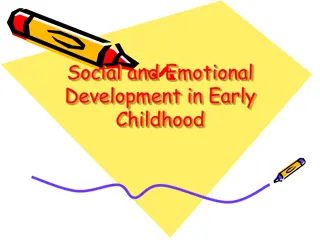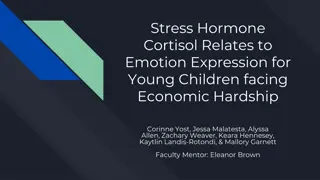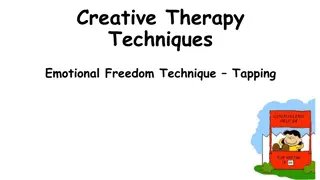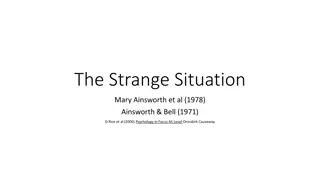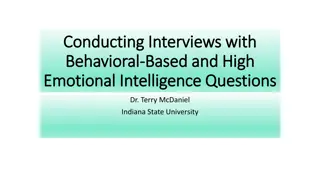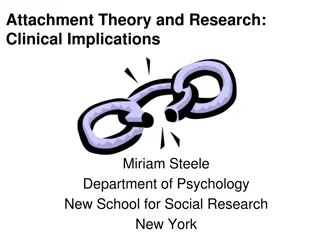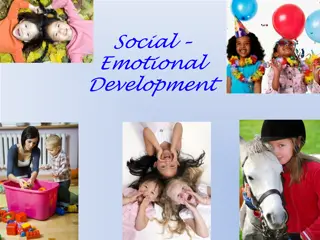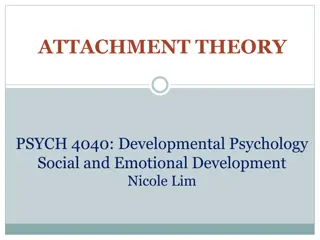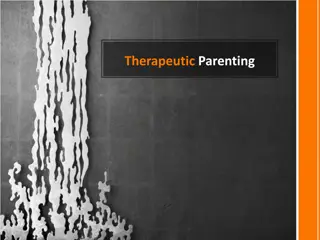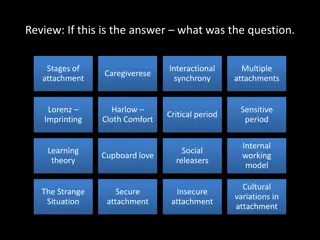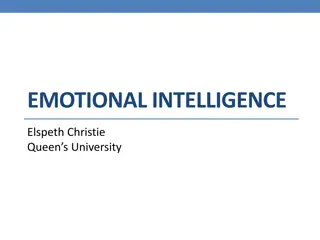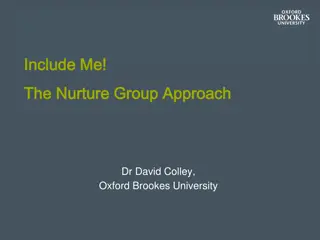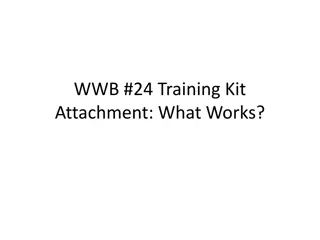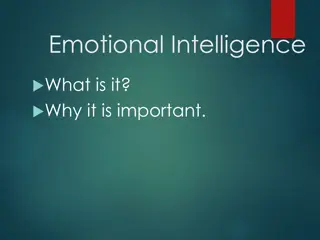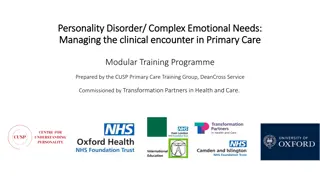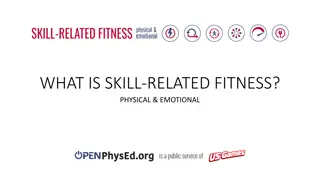Circle of Security-Parenting: Enhancing Attachment for Child Development
The Circle of Security-Parenting program, an attachment-based intervention that supports children's mental health. Discover the benefits of secure attachment and understand the different types of insecure attachment. Find out how the program helps caregivers meet their child's attachment needs and r
31 views • 12 slides
Understanding Emotional Patterns in Families
Families play a crucial role in shaping individuals' emotional responses and behaviors. Caregivers influence how we perceive and manage emotions, impacting our emotional well-being. By examining how different emotions are accepted, rejected, and modeled within families, one can gain insights into th
10 views • 14 slides
Understanding Children's Emotional Development in Daycare from a Psycho-Social Perspective
Scientific evidence emphasizes the early onset of emotional development and its profound impact on lifelong outcomes. The quality of childcare processes plays a pivotal role in shaping children's social-emotional development, highlighting the importance of nurturing emotional relationships in daycar
0 views • 10 slides
Modern Perspectives on Attachment Theory: Bridging Research and Practice
Delve into the contemporary developments in attachment theory within social work and education. Explore how practitioners and researchers are navigating outdated notions and embracing newer insights to enhance their understanding and application of attachment concepts.
1 views • 16 slides
Understanding Emotional Labor in Organizational Behavior
Emotional labor involves employees expressing organizationally desired emotions during work interactions, impacting job performance. Employees may face emotional dissonance when projecting one emotion while feeling another, leading to surface or deep acting. Affective Events Theory (AET) suggests th
0 views • 19 slides
Understanding Emotional Wellness for Inner Well-Being
Exploring the importance of emotional wellness in cultivating inner well-being, this content delves into the facets of social, mental, and emotional well-being. It emphasizes the significance of acknowledging and accepting our feelings, maintaining a positive outlook, and finding purpose and peace w
1 views • 27 slides
Understanding Autism Spectrum Disorder and Attachment: Insights from the Coventry Grid
Exploring the commonalities, desired outcomes, concerns leading to assessment, and the Coventry Grid regarding autism spectrum disorder and attachment. The Coventry Grid highlights the lack of flexibility of thought and behavior in individuals with ASD, emphasizing the importance of predictability,
0 views • 50 slides
Early Childhood Social and Emotional Development Insights
Social and emotional development in early childhood is influenced by various factors such as family dynamics, parenting styles, peer interactions, and cultural backgrounds. Erikson's stages highlight the importance of initiatives and self-understanding in shaping emotional growth. Parents play a cru
2 views • 35 slides
Understanding Emotional Intelligence in the Workplace
Explore the significance of emotional intelligence in the workplace, its definition, five competencies, case studies, and strategies to enhance skills. Dive into scenarios, role-plays, misconceptions, and why emotional intelligence is crucial for professional success. Learn about managing emotions,
0 views • 33 slides
Understanding Love Styles in Relationships Based on Attachment Theory
Early life experiences play a crucial role in shaping how we love in relationships. Milan and Kay Yerkovich have developed tools rooted in attachment theory to help individuals understand and improve their love styles. People tend to fall into five categories of Love Styles, such as the Avoider, who
1 views • 22 slides
Understanding Emotional Intelligence: Key Principles and Skills
Emotional intelligence, as presented by David Taylor, is crucial in perceiving, understanding, and managing emotions in oneself and others. It plays a vital role in professional and personal relationships by enhancing emotional awareness, recognition, and management. The principles of emotional inte
1 views • 22 slides
Understanding the Impact of Cortisol on Emotional Expression in Young Children Facing Economic Hardship
This study explores how the stress hormone cortisol is related to emotional expression in young children experiencing economic hardship. Cortisol levels can indicate stress, but prolonged exposure to stress can lead to desensitization. The research focuses on children attending Head Start preschools
0 views • 15 slides
Understanding Emotional Abuse: Signs, Effects, and How to Respond
Explore the intricacies of emotional abuse through the eyes of Dr. Katia Reinert, Associate Director of GCHM. Delve into the techniques used by emotional abusers, self-assessment for identifying abuse, effects of abuse, and guidance on how the Christian community can help. Discover the challenges of
1 views • 31 slides
Understanding Emotional Freedom Technique (EFT) Tapping for Emotional Wellness
Emotional Freedom Technique (EFT) tapping, rooted in acupressure, offers a holistic approach to addressing stress, fear, and phobias. This body-centered therapy draws on ancient Chinese practices, stimulating specific acupoints to improve energy flow. Studies show effectiveness in treating depressio
0 views • 4 slides
Understanding Sternberg's Triangular Theory of Love and Attachment Styles
Sternberg's Triangular Theory of Love defines the key dimensions of a healthy romantic relationship as intimacy, passion, and commitment. These components play vital roles in shaping relationships and can be influenced by attachment styles developed in infancy. Secure attachment leads to greater rel
1 views • 19 slides
Understanding Attachment, Trauma, and Life Stories in EMDR Therapy
Explore the impact of attachment-related trauma on adult attachment classifications, the significance of life stories in shaping our present, and how EMDR therapy helps individuals make sense of challenging childhood experiences to create a coherent narrative for healing and growth.
0 views • 66 slides
Understanding Infant Attachment Through the Strange Situation Experiment
The Strange Situation experiment conducted by Mary Ainsworth et al. in 1978 aimed to describe and evaluate the attachment relationship between caregivers and infants. The study involved observing caregiver-infant interactions through separations and reunions to classify attachment types such as secu
1 views • 6 slides
Enhancing Emotional Intelligence Through Behavioral Interview Questions
Explore the key aspects of emotional intelligence, including social-emotional competencies and cognitive, affective, and behavioral competencies. Learn how to conduct interviews focused on emotional intelligence and discover the importance of relationships, self-awareness, responsible decision-makin
0 views • 44 slides
Insights into Attachment Theory and Clinical Implications
Explore the clinical implications of attachment theory, as discussed by Miriam Steele and Bowlby, highlighting how early attachment patterns persist into adulthood and influence relationships. Learn about the Strange Situation test, Adult Attachment Interview, and intergenerational patterns of attac
0 views • 34 slides
Understanding Social and Emotional Development in Young Children
Explore the general emotional patterns and specific emotions in young children aged 4 to 6 years. Understand the positive and negative characteristics such as self-centeredness, independence, anxiety, and fear, and learn how to deal with common fears like imaginary dangers and separation anxiety. Re
1 views • 19 slides
Safeguarding Infants from Emotional Maltreatment: What Works?
Safeguarding infants from emotional maltreatment is crucial during the first two years of life. Emotional abuse, though not always accompanied by physical or sexual abuse, can have severe impacts on a child's development. The paper explores the structure, prevalence, and impact of emotional abuse on
3 views • 59 slides
Understanding Attachment Theory in Developmental Psychology
Attachment theory in developmental psychology, pioneered by Bowlby and Ainsworth, examines the emotional bonds between infants and caregivers. It delves into phases of attachment development, key components, and evaluation methods such as the Strange Situation Procedure. The theory emphasizes the si
0 views • 13 slides
Understanding Canine Attachment and Cross-Species Relationships
Dogs exhibit strong social attachment to humans, forming enduring bonds that serve as a secure base. This attachment benefits both organisms, providing resources for survival and establishing social structures. Imprinting studies suggest that animals, like humans, develop proximity-seeking behaviors
0 views • 29 slides
Understanding Therapeutic Parenting for Children with Trauma and Attachment Disruption
Therapeutic parenting is a child-centered approach tailored to address the complex emotional and behavioral needs of kinship, adopted, or permanent care children who have experienced attachment disruption and trauma. It focuses on nurturing, empathy, and building trust while refraining from conventi
0 views • 13 slides
Understanding Bowlby's Attachment Theory: A Comprehensive Overview
This content provides an in-depth exploration of Bowlby's Attachment Theory, covering key concepts such as stages of attachment, interactional synchrony, multiple attachments, imprinting, secure and insecure attachment styles, and the impact of maternal deprivation. It also delves into short-term an
0 views • 22 slides
Understanding Emotional Intelligence and its Components
Emotional Intelligence is about identifying, understanding, and managing emotions, recognizing your own needs and those of others, and enhancing interpersonal skills. It involves self-perception, self-expression, and affects decision-making and stress management. People with high emotional intellige
0 views • 20 slides
Understanding the Significance of Attachment in Supporting Vulnerable Children
Attachment plays a crucial role in the well-being of children, especially those in care. It influences their emotional and behavioral responses, impacting their overall development. This content emphasizes the importance of providing proper support and attachment relationships for children facing ad
0 views • 24 slides
Exploring the Nurture Group Approach and Attachment Theory
Delve into the Nurture Group Approach and Attachment Theory, examining the key ideas and theorists involved. Secure attachment and its evolutionary significance in fostering healthy relationships are highlighted. The importance of warm, continuous caregiver relationships in child development is emph
0 views • 29 slides
Understanding Adolescent Development and Emotional Intelligence by Finbar Chambers
This collection presents insights on Gardner's Multiple Intelligences, Emotional Intelligence, and the importance of understanding adolescent development. Finbar Chambers explores emotional makeup, behavior management strategies, and the transition to independence during adolescence. Discover the im
0 views • 20 slides
Understanding Attachment in Young Children and Caregivers
Attachment plays a crucial role in the development of young children, shaping their sense of security and emotional well-being. Secure relationships help children manage emotions and foster healthy identities, while insecure attachments may lead to behaviors like inhibition of exploration and diffic
0 views • 12 slides
Understanding Emotional Labour in Probation Practice
Explore the concept of emotional labour in probation practice, highlighting the management of emotions, impact on research and practice, links to burnout, and the role of managerialism and rationality. Delve into emotional work, Chamberlayne's 'emotion work', and feeling rules associated with emotio
0 views • 16 slides
Importance of Emotional Intelligence in Religious Leadership
Religious leaders benefit greatly from high emotional intelligence, leading to better performance, increased staff retention, and a more positive work environment. Emotional intelligence plays a vital role in pastoral ministry, enhancing emotional care for congregants. Educational programs focusing
0 views • 15 slides
Understanding Emotional Intelligence in the Workplace
Emotional intelligence plays a crucial role in professional success, impacting how we lead teams, handle pressure, and build relationships. This webinar explores the definition of emotional intelligence, its significance in the workplace, and practical ways to enhance it. Discover the key elements o
0 views • 14 slides
Understanding Emotional Intelligence: Definition, Importance, and Examples
Emotional intelligence, a term that originated in the 1960s, refers to the ability to recognize and manage emotions in oneself and others effectively. It involves identifying emotions, understanding their impact, and using this awareness to guide behavior. Emotional intelligence is crucial for perso
0 views • 35 slides
Understanding the Pain of Breakups Through Attachment Theory
Exploring the intense emotional pain of breakups, this presentation delves into Bowlby's Attachment Theory to elucidate the deep bonds that connect individuals and the biological instincts that drive the need for closeness during times of discomfort or threat. Through poignant breakup songs, persona
0 views • 41 slides
Understanding Attachment Trauma and Healing Process
Attachment trauma involves disruptions in forming bonds, leading to complex trauma that affects neurological development. Therapy aims to create compassionate healing opportunities for individuals struggling with attachment-based trauma, addressing both big and little "t" traumas to increase emotion
0 views • 37 slides
Social-Emotional Health and Resilience of Teachers in East European Countries
This study explores the social-emotional health and resilience of teachers in Latvia, Lithuania, and the Slovak Republic as part of an Erasmus+ project aimed at developing a digital support system to promote their well-being. The interplay between mental health, social-emotional health, and resilien
0 views • 30 slides
Research Collaboration: Enhancing Parenting Interventions through Psychometric Tools
Research visit to the LAG Lab at the University of Pavia focuses on exploring evidence-based attachment parenting interventions and the use of psychometric tools to enhance parenting processes and outcomes. The collaboration aims to address the lacking research on emotional attachment and parenting
0 views • 10 slides
Understanding Personality Disorders and Complex Emotional Needs in Primary Care
This training program focuses on managing clinical encounters related to personality disorders and complex emotional needs in primary care settings. Modules cover developmental factors, building trusting relationships, and the biopsychosocial model's impact on attachment, trauma, and mentalizing. At
0 views • 9 slides
Understanding Skill-Related Fitness: Physical and Emotional Aspects
Skill-related fitness encompasses both physical and emotional components, such as agility, balance, coordination, power, reaction time, and speed. Physical agility involves quick body movements, while emotional agility relates to positive responses in various situations. Physical balance requires we
0 views • 7 slides
